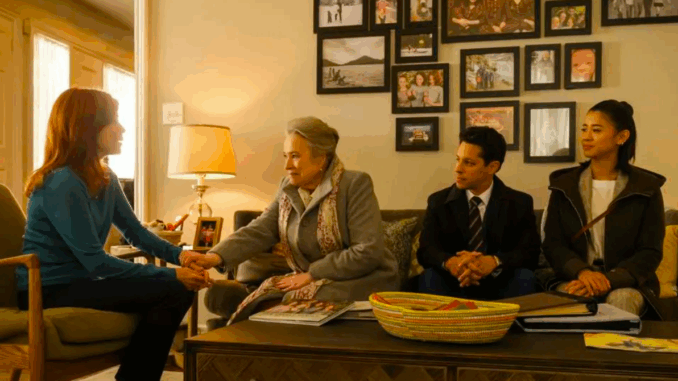
A Familiar Name, A Radical Rethink
When CBS announced it was rebooting Matlock — the beloved 1980s courtroom procedural that made Andy Griffith a household name all over again — industry insiders were skeptical. Could the old-school charm of a folksy Southern defense attorney possibly translate to a modern legal landscape filled with prestige drama, streaming competition, and fast-talking legal thrillers? The answer, surprisingly, is yes. But not in the way anyone expected.
The new Matlock, developed by Jennie Snyder Urman (Jane the Virgin), doesn’t just revive the series. It reinvents it. With Academy Award-winner Kathy Bates leading the cast as Madeline “Matty” Matlock, the reboot trades the slow burn of the original for a complex, character-driven drama that’s as emotionally layered as it is legally sharp. And in doing so, CBS has pulled off something rare: a reboot that honors its past while fully embracing the present.
Kathy Bates: A Legal Legend in Her Own Right
Bates isn’t playing Ben Matlock’s daughter or niece or some long-lost protégé. She is Matlock — or rather, she is Matty Matlock, a legal savant who operates under the radar, hides in plain sight, and turns her age and warmth into weapons of strategy. Bates brings wisdom, weariness, and wicked humor to the role, embodying a woman who’s been underestimated for too long.
This isn’t just a gender swap; it’s a tonal transformation. Bates’ Matlock isn’t concerned with impressing juries or charming judges. She’s playing chess in a world that thinks she barely knows the rules. The pilot’s reveal — that she cons her way into a high-powered firm to seek justice for her daughter — sets the emotional tone for the season. Beneath every cross-examination is a personal agenda. Every win is earned, but never clean.
At 76, Bates is rewriting the rules for lead roles in network dramas. She’s not an action hero or a glamorized detective. She’s a woman who walks into a courtroom with a lifetime of pain, patience, and power, and absolutely no need to prove herself to anyone.
A Modern Courtroom for Modern Crimes

The cases in Matlock 2.0 aren’t ripped from headlines in the traditional sense. Instead, they pull from deeper societal anxieties: whistleblowers in tech, institutional betrayal, bias in jury selection, and the emotional cost of justice. Each episode asks what justice actually looks like — not just in the letter of the law, but in its moral implications.
Unlike the episodic structure of the original, the reboot uses serialized arcs to explore both legal and personal stakes. The mystery doesn’t always wrap up neatly in 44 minutes. And that’s intentional. This Matlock leaves space for doubt, gray areas, and quiet reckoning.
Urman and her writers’ room have taken care to walk the tightrope between mystery-of-the-week storytelling and emotionally resonant character work. The show doesn’t rely on flashy twists or shock value. Instead, it builds tension slowly, often through Matty’s quiet observations — or a single glance across the courtroom.
Rewriting the Rules for Network Drama
It’s easy to underestimate network procedurals in an age dominated by streaming and cable prestige dramas. But Matlock has quickly emerged as a counterargument to that narrative. With sharp scripts, a standout cast, and thematic complexity, it’s proving that weekly TV can still be smart, rich, and relevant.
Kathy Bates isn’t the only standout. Supporting players like Skye P. Marshall (as a skeptical younger partner) and Jason Ritter (as a conflicted junior associate) give the series a necessary generational contrast. They challenge Matty. They challenge each other. And in doing so, they help anchor the show in the present — where ambition, ethics, and identity intersect in increasingly complicated ways.
Even visually, the reboot feels fresh. Gone are the static courtrooms and dated sets of the ‘80s version. In their place: glassy law firms, echoing hallways, and sunlit scenes of Los Angeles that contrast sharply with the emotional heaviness of the cases. The series looks like it belongs on any prestige streamer — but it airs at 9PM on CBS, where generations of Americans still go for comfort TV.
A Legacy Worth Reinventing
What makes this reboot work is its refusal to treat Matlock as sacred. It doesn’t chase nostalgia. It doesn’t lean on catchphrases or winks to the original. Instead, it asks: what made Matlock matter in the first place? The answer, it turns out, was never just the white suit or the Southern drawl. It was the idea of a lawyer who looked ordinary but delivered justice in extraordinary ways.
In today’s version, that justice comes with more emotional complexity. And it’s driven by a woman who knows how the world sees her — and uses that to her advantage, all while carrying the weight of personal loss.
For longtime fans, it’s a respectful evolution. For new viewers, it’s a timely drama that doesn’t require a history lesson. Either way, Matlock is no longer just a courtroom classic. It’s a show that stands, walks, and wins on its own two feet — one thoughtful step at a time.